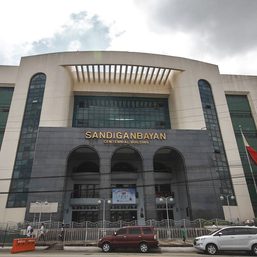SUMMARY
This is AI generated summarization, which may have errors. For context, always refer to the full article.
![[OPINION] Jailing Jinggoy](https://www.rappler.com/tachyon/2024/01/tl-jailing-jinggoy.jpg)
For the crimes for which she has been convicted that involve such powerful individuals as senators and congressmen, including cabinet-rank presidential advisers who sit in the same table Ferdinand R. Marcos presides over, Janet Lim-Napoles will most likely spend the rest of her life in jail. While the charges against her involve several from attempted bribery, to bribery, all the way to plunder, and whether she serves her individual sentences concurrently or consecutively, or whether time-served in detention discounts from the total, relative to the powerful involved in her crimes, the chances that they join her are slim to none.
Perhaps it is because she has been identified to be the criminal mastermind behind the Priority Development Assistance Fund (PDAF) scam while the politicians with their individual pork barrels have lesser roles and indirect accountabilities. Or perhaps, on a case-to-case basis, their individual amounts are smaller, the evidence better hidden, and their political clout, far above the laws they’ve written for the rest of us not entitled to be called “honorable.”
The wheels of justice grind excruciatingly slow and for the powerful, they grind even slower. If at all. From the legitimate to the absurd, from the rational to the speculative, and indeed, from the legal to the political, the unfathomable reasons that Napoles’ co-conspirators remain scot-free are legion.
Never mind rationality. And never mind absurdity. In our exceedingly charged political milieu, the vast difference between the legal and political is perhaps the most potent factor that differentiates and determines how justice is meted out.
The recent conviction of Jose Pimentel Ejercito Jr. (aka Jinggoy Estrada) for bribery and attempted bribery is a case in point. That the decision by a division of the Sandiganbayan did not cover plunder is a matter of amounts and not a question of criminal acts committed by the convicted. It is especially applicable where the crime is complex and involves several parties, both private individuals and public officials. In other words, the non-plunder conviction was not because of the convict’s innocence but because of an arithmetic threshold applicable to those holding a public office.
The peso amount is important. Later we will realize its impact in determining the time Estrada might eventually serve behind bars, or if he will even be jailed at all.
While substantial deposits were nevertheless discovered in bank accounts identified to be Estrada’s, and while these were concurrently transacted with the timing of pork barrel releases and subsequent deposits to accounts identified to be Napoles’, the minimum amount needed for a conviction of plunder eventually fell short of P50 million (see G.R. No. 220598. April 18, 2017).
Never mind that initially, these accumulated beyond the threshold level differentiating plunder. After fine tuning, the P50-million threshold automatically took plunder off the table as much as it took reclusion perpetua off the menu of punitive options since the latter is the maximum applied to plunder.
While Estrada now stands convicted and the question of bail granted by the Sandiganbayan is no longer applicable, he still has the Supreme Court (SC) to which he can appeal for a reconsideration. Since the SC option remains as a venue that could reverse the Sandiganbayan’s conviction, it is arguable that Estrada likewise remains innocent pending the complete exhaustion of his legal options until finally being proven guilty by the final arbiter in the judicial hierarchy.
The speedy application of justice has long been an issue with our justice system. That cases can fester, die, or descend into irrelevance and mootness within a court remains a curse. Dockets are full, procedural dilatory tactics abound, and always there seem to be more venues for respondents than there might be for appellants.
And then there is the unseen political hand. It makes sense that upon his conviction, Estrada himself denied that politics had any influence on the Sandiganbayan decision. He is probably right.
On the question of speedy justice, it also makes sense that among the lower courts, a division of the Sandiganbayan need not to seek en banc deliberations for a case to be raised to the SC. This affords the judicial system at least two upsides.
One, it removes an incremental venue for repetitive or redundant processes among peers who might be relatively unfamiliar with the minutiae of cases. Two, it insulates and protects the other divisions from any negativity from decisions taken by others within the court. This ensures that the Sandiganbayan as a whole remains essentially, or substantially, credible. As a whole, we believe it is.
A couple of inevitable non-political logistical realities likewise work in Estrada’s favor. These also serve to keep him from being locked up.
The SC dockets are clogged and full and it is not unusual that any case elevated to them would take time before any finality is achieved.
The characteristic of the charges at the Sandiganbayan where plunder was avoided while the acts involving the PDAF were nevertheless considered brings into the arithmetic that determines total jail time the period served by Estrada while in detention. In other words, the “time served” discount may reasonably be applied to reduce the total jail time should he suffer a final conviction at the SC.
Estrada is a senior citizen. Do the math. Consider the average time the SC takes prior to a decision. Consider also that at the SC, decisions at the division level are subjected to the en banc. Finally, add to the timeline a period to consider motions for reconsideration. Within this normal process, Estrada’s detention “time served” discount may apply and by the time the balance comes due, Estrada might well be within the temporal Goldilocks zone where “compassion” is applied to senior citizens.
In our justice system, the saga of the People v Jinggoy is far from over. – Rappler.com
Dean de la Paz is a former investment banker and managing director of a New Jersey-based power company operating in the Philippines. He is the chairman of the board of a renewable energy company and is a retired Business Policy, Finance, and Mathematics professor. He collects Godzilla figures and antique tin robots.
1 comment
How does this make you feel?
![[#Shocking] Jinggoy, convicted sa bribery pero hindi sa plunder. Puwede ba ‘yon?](https://i.ytimg.com/vi/VfKvhhPSfQg/hqdefault.jpg)
![[OPINION] Court trial vacancies and presidential appointments](https://www.rappler.com/tachyon/2024/01/TL-court-trial-vacancies-jan-12-2024.jpg?fit=449%2C449)





Yes, our Justice System is slow and even slower for the rich and powerful. Add a Political Hand and money’s influence to this slow pace with the bias for the rich and powerful, and we have thoroughly and realistically described the Philippine Justice System.